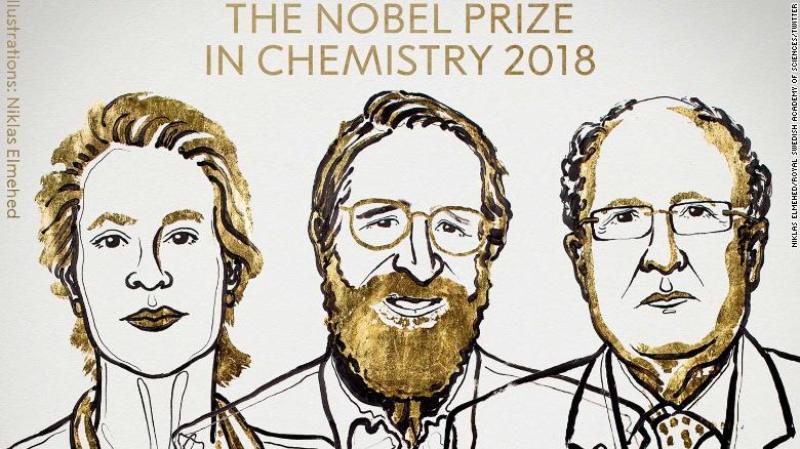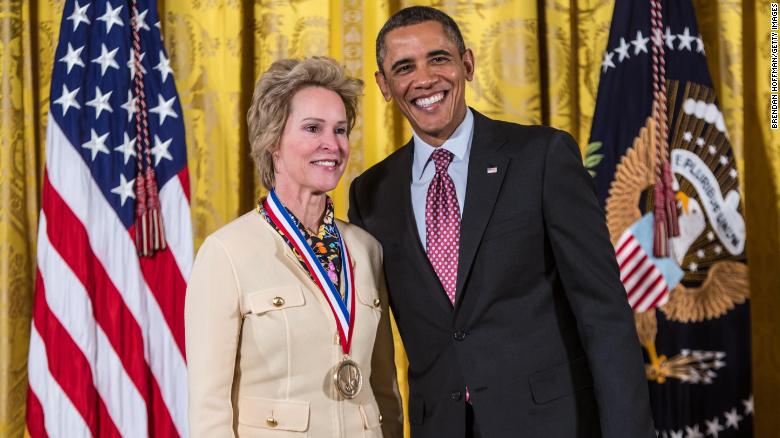Nobel Prize in Chemistry awarded for pioneering work in evolutionary science



The 2018 Nobel Prize in Chemistry was awarded to Frances H. Arnold and the other half jointly to George P. Smith and Sir Gregory P. Winter on Wednesday for their work harnessing the power of evolution to develop new proteins used in drugs and medical treatments.
In announcing the award, the Royal Swedish Academy said that this year's prize "awards a revolution based on evolution," and goes to scientists who "applied the principles of Darwin in the test tube."
The methods developed by the laureates have been put to work to create new enzymes and antibodies used in promoting a greener chemicals industry, mitigating disease and saving lives.
Arnold, of the California Institute of Technology, was recognized for performing the first-ever "directed evolution" of enzymes -- proteins that catalyze chemical reactions -- to see if they could be tailored to work differently, for example in new environments.
Arnold directed an enzyme's evolution by introducing genetic mutations to create multiple variants of a chosen enzyme. She would then see the effect each mutation had and choose the variants that could prove to be useful, such as one that could operate in a solvent, rather than a water-based environment.
Her methods are now routinely used to develop new catalysts, in turn used for "more environmentally friendly manufacturing of chemical substances, such as pharmaceuticals, and the production of renewable fuels for a greener transport sector." The American scientist and engineer becomes only the fifth woman ever to have won the prize, following Ada Yonath in 2009, Dorothy Crowfoot Hodgkin in 1964, Irène Joliot-Curie in 1935, and her mother, Marie Curie, in 1911.

President Barack Obama awards the National Medal of Technology and Innovation to Frances H. Arnold in a ceremony at the White House on February 1, 2013.
Smith, a professor at the University of Missouri, won for a technique known as "phage display," which uses bacteriophage -- a virus that infects bacteria -- to evolve new proteins.
Bacteriophage infects bacteria in order to reproduce. It inject its genetic material into bacteria and seizes upon the metabolism of the bacteria to produce more of irtself. Smith genetically engineered the bacteriophage, inserting unknown genes to see what proteins would be made, as the proteins would end up displayed on the surface of the phage.
Winter, of the University of Cambridge in the UK, then harnessed that method and used it to direct the evolution of new antibodies -- immune proteins that bind to and neutralize pathogens such as bacteria or viruses -- with the aim of making new drugs.
He built up a collection of phages, with billions of antibody varieties on their surface, and engineered them make them more effective.
The first pharmaceutical created using this method was adalimumab, approved for use in 2002, which is used to treat rheumatoid arthritis, psoriasis and inflammatory bowel diseases.
Phage display has since been used to produce antibodies that can neutralize toxins, counteract autoimmune diseases and cure metastatic cancer.
"Today's Nobel Prize in chemistry highlights the tremendous role of chemistry in contributing to many areas of our lives including pharmaceuticals, detergents, green catalysis and biofuels. It is a great advert for chemistry to have impact in so many areas," said the Royal Society of Chemistry president, Professor Dame Carol Robinson.
"It would have been hard to predict the outcome of this research at the start -- this speaks to the need for basic research."




2018 Nobel Prize winners awarded due to pioneering adaptation of the power of evolutionary science. Demonstrable power of what some staggeringly ill-informed people deem as 'pseudoscience'.
btw.. genetics is how we know how old mankind is and when divergence of the species happened. It's all in the mitochondria and that is a rare fact.
That's a matrilineal thing which is why science should ignore it.
Simply more proof that will be ignored
I think it's more than being ignored. It's that it's hard to understand, and what people don't understand (or have the desire to understand), they dismiss.
But then we have willful ignorance - simply accepting as truth the platitudes and slogans of other people. I have no sympathy for those who are too damn lazy (or frightened) to do a little research. It is incredibly easy to learn about evolution. I have several times pointed people to biologos.org which is a Christian website that does a very good job of explaining science to Christians.
For example, check out this very well done video on evolution:
but, but, but...